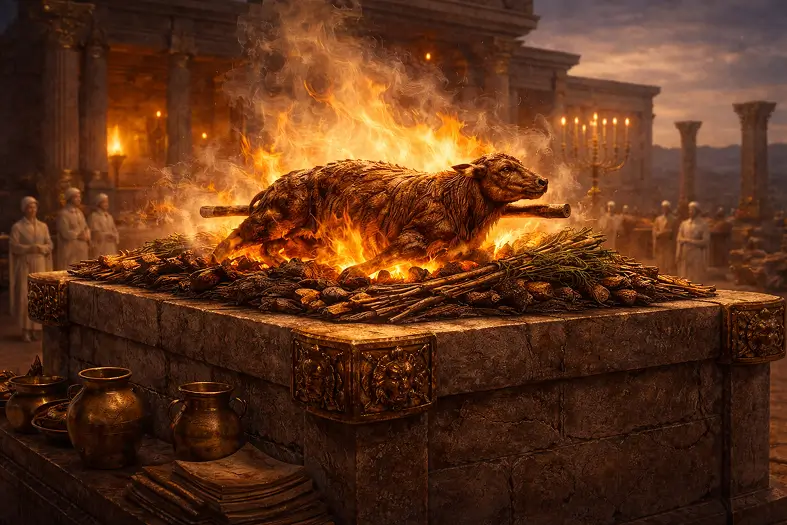


The fat of the Korban Pesach must not remain overnight but must be burnt on the altar the same night.
This mitzvah forbids allowing the sacrificial fats (cheilev) of the Korban Pesach to remain until morning. They must be consumed on the altar the night they are offered. Rambam (Hilchot Korban Pesach 1:6–7; Hilchot Ma’aseh HaKorbanot 4:2) codifies that failure to burn them on time transgresses this mitzvah.
Sefer HaChinuch (Mitzvah 488) explains that sacrifices must be completed promptly, showing zeal in the service of Hashem. Leaving fats overnight suggests negligence or disregard for sanctity. The Talmud (Pesachim 59b) emphasizes the Pesach’s unique urgency, tied to the redemption it commemorates. Rashi (Ex. 23:18) notes that “My festive offering” refers specifically to the Pesach, highlighting its centrality. Ramban adds that this mitzvah parallels the prohibition of notar (leaving sacrificial meat past its time), ensuring full devotion without delay.
Commentary & Classical Explanation:
Contrast with Notar of Sacrificial Meat (Mitzvah 395):
Parallel to Burning Leftover Sacrifices (Mitzvah 398):


Concerns the Beit HaMikdash, korbanot (offerings), and priestly service.
Represents the concept of spiritual intentionality, purity, and sanctity—set apart for a higher purpose.
Signifies awe and reverence toward Hashem—living with awareness of His greatness and presence.
Represents Emunah—the deep, inner trust in Hashem’s presence, oneness, and constant involvement in our lives. This badge symbolizes a heartfelt connection to G-d, rooted in belief even when we cannot see. It is the emotional and spiritual core of many mitzvot.
Mitzvot related to the Jewish festivals — their observance, rituals, prohibitions, and spiritual significance. This includes Torah-commanded holidays like Pesach, Shavuot, and Sukkot, as well as rabbinic celebrations such as Purim and Chanukah.
Mitzvot that define and deepen the relationship between a person and their Creator. These include commandments involving belief, prayer, Shabbat, festivals, sacrifices, and personal holiness — expressions of devotion rooted in divine connection.

Dive into mitzvos, prayer, and Torah study—each section curated to help you learn, reflect, and live with intention. New insights are added regularly, creating an evolving space for spiritual growth.

Explore the 613 mitzvos and uncover the meaning behind each one. Discover practical ways to integrate them into your daily life with insights, sources, and guided reflection.

Learn the structure, depth, and spiritual intent behind Jewish prayer. Dive into morning blessings, Shema, Amidah, and more—with tools to enrich your daily connection.

Each week’s parsha offers timeless wisdom and modern relevance. Explore summaries, key themes, and mitzvah connections to deepen your understanding of the Torah cycle.